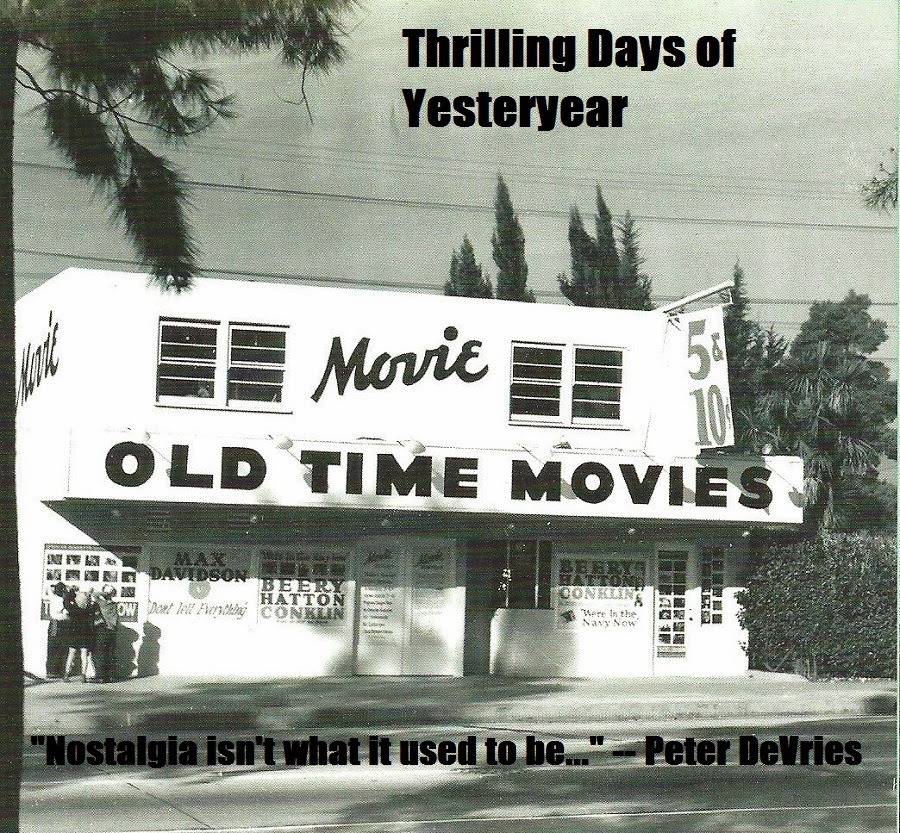The history of silent film preservation is a troubling
one. In 2013, The Library of Congress
issued a report that estimated 75 percent of the feature films made in the U.S.
during the silent era are now lost to future generations of classic movie
lovers. This depressing news doesn’t
even take into consideration the number of vanished short films made at that same time,
nor does it address the number of sound movies that have also disappeared. It can’t even begin to scratch the surface of
the gaps in foreign cinema, either. So when news is
reported that a previously lost movie has resurfaced (often in the unlikeliest
of places) or I get a heads-up that donations are being requested to bring
silent movies to DVD (as in the case of two recent campaigns to make the Marion
Davies features When Knighthood Was in
Flower [1922] and The Bride’s Play [1922} accessible to home video fans), it
brings a smile to my usually stone-faced countenance (something I suspect I inherited
from my days of watching Buster Keaton).
That face was the recipient of another ear-to-ear grin when I
received an e-mail from Clint Weiler (at CWPR) offering me the opportunity to
review a book written by journalist/film critic Phil Hall about the subject of
film preservation, In Search of Lost Films. In
Search has just been published by BearManor Media (full disclosure: BMM’s
Ben Ohmart and I have been chums for many years), a first-rate history on the
subject of just how these cinematic treasures—silent and sound, U.S. and
foreign—have turned to dust in what Hall himself describes in one chapter as
“the roots of a cultural tragedy.” Hall,
a contributing editor for Film Threat
magazine and author of other BearManor releases including The History of Independent Cinema
and The Greatest Bad Movies of All Time,
hits one out of the park with this enjoyable read; at the risk of resorting to
cliché, In Search is a real
page-turner, one of those books in which you’d be willing to knock someone down
just to get to the next chapter.
Phil discusses his subject over a number of fascinating
chapters; he provides a history of early movie making in the first section, and
how those pioneers weren’t motivated by art but by the pursuit of the almighty
dollah (which goes a long way toward explaining why so many of these movies no
longer exist—preservation was a move made in hindsight). “Lost Films, Lost Careers” highlights how the
likes of Theda Bara and Lon Chaney (you can imagine my delight that mirthmakers
like Lloyd Hamilton and Raymond Griffith are also included) have had their silver
screen legacies suffer due to the absence of many of their works. There are also sections devoted to lists of now-lost
and culturally significant silent films (The
Great Gatsby, Hats Off) and sound presentations (The Rogue Song, Convention
City), with Hall providing extensive background on the production history
(when available) of these members of the cinematic “disappeared.”
“In Search of Missing Sequences and Segments” concentrates
on indisputable classics (The Wizard of
Oz, The Magnificent Ambersons) that were cut down from their original
versions…and the extant footage no longer exists. The last chapter, “The Age of Recovery and
Rediscovery,” contains a list of films thankfully revived from their MIA state;
I chuckled audibly when I read that John Cassavetes’ original version of Shadows (1959), his debut feature, was
discovered in the Lost and Found Department of the New York City subway system.
Naturally, I was a ready-made audience for this book, and I
particularly enjoyed how many of the lists of missing silent/sound films don’t
duplicate the ones tallied in Frank Thompson’s excellent Lost Films (Thompson steered clear of lost “talkies” in his tome as
well). There are also wonderful quotes
from some of the folks I’m proud to share Facebook with—film history experts like
Ron Hutchinson, Jim Neibaur, Ben Model (his Accidentally
Preserved series gets a nice mention), and Steve Massa (whose book Lame
Brains & Maniacs is going to be the next one I tackle, I swear—I have
the Kindle edition, so there’s no excuses).
Any classic movie fan who’s ever wiped away a tear—knowing that there
are so many wonderful films that have since departed for that Great Movie
Palace in the Sky—needs to purchase a copy of In Search of Lost Films…and keep it on hand for reference, to make
certain we do what we can to keep another parade from going by.






2 comments:
For those interested in Lost Movies and mystery fiction, I just wanted to recommend Loren Estleman's Valentino series of short stories and novels. Valentino is a "film detective" working in the Film Archives Dept at UCLA -- great fun for fans of old/lost films.
Greg suggested we visit our local library:
For those interested in Lost Movies and mystery fiction, I just wanted to recommend Loren Estleman's Valentino series of short stories and novels. Valentino is a "film detective" working in the Film Archives Dept at UCLA -- great fun for fans of old/lost films.
Thanks for the heads-up, Greg -- sounds like it's worth investigating (apologies for the pun).
Post a Comment